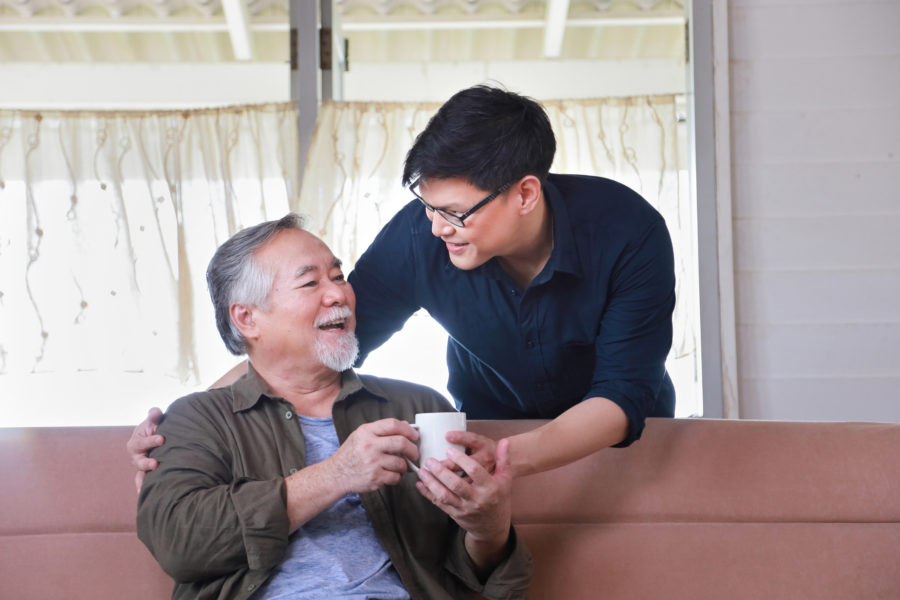Know that you’re doing the best that you can taking care of your aging parent. But sometimes it can become difficult, overwhelming, frustrating and exhausting. Studies show that we tend to neglect self-care when caring for a parent with dementia, and caregiver depression, stress and burnout are very common. To help you manage the demands and responsibilities of caregiving, put into practice some of my ‘SACRED’© self-care strategies while caring for a parent with dementia.
S = Stop “Shoulding” Yourself
Shoulda, coulda, woulda. We all know how disheartening these words can be. Instead, replace “shoulda, coulda, woulda” with what you CAN, WILL and WANT to do. Focusing on what you can, will and want to do empowers you and gives you a sense of control. It helps with time management, prioritizing, and establishing realistic expectations. At the end of each day, compliment yourself for the thing(s) you did DO!
A = Acknowledge Your Feelings and Emotions
Some of the most common emotions people share with me is feeling angry and resentful that they don’t have time for themselves because they are so busy caring for everyone else. The tendency is to repress these feelings which only intensifies them. Know that these feelings are normal. It’s OK to feel resentful, angry, frustrated or annoyed. That’s part of being human. Allow your feelings and emotions to be of benefit to you. One of the best ways to gauge how you’re doing is by listening to what your feelings and emotions are telling you. By acknowledging those feelings and emotions, no matter how negative, gives you an opportunity to change what you are doing. Instead of beating yourself up for feeling this way, ask yourself the following questions: 1) What are your emotions trying to tell you? 2) What is causing you to feel this way? 3) What do you need to do differently?
C = Comfort Yourself – Compassionate Self-Talk
When things are tough, make a conscious effort to speak lovingly and compassionately to yourself. Take a daily 10-minute break and do something nurturing or comforting – give back to yourself. Caring for others can be really hard. Speak kindly to yourself in the same way you would support a best friend if they were in your shoes. Repeat the following Compassionate Self –Talk Phrases to yourself as a reminder of the loving, caring and compassionate person you are.
- The decisions I make are with the best of intentions
- I’m not a failure. I’m learning as I go along
- Patience is a learned skill and I’m working on it
- I’m going to have negative thoughts and feelings but that doesn’t make me a bad person
- I’m doing the best I can – some days are better than others
R = Resources – Create a Support Network
You can’t do this alone! You need help and support too, so reach out to people who can be of support and help. How to do this? Use my 3-Step process:
- Write down what you need help with
- Make a list of resources that are available
- Ask for help – utilize these resources!
E = Establish an Emergency Plan
Being prepared for the unexpected is an excellent strategy to help you manage your concerns. If you know that things are in place in case of an emergency, it can alleviate a lot of angst. Some things to consider are: a) signing your parent up for a medical alert program in case of an emergency if you aren’t there when it happens, b) complete legal documents and such as a Living Will, Trust, POA (Power of Attorney) for medical and financial, c) fill out the POLST and HIPAA forms, d) have updated lists of doctors/medications, computer passwords and local emergency contacts are very helpful and comforting.
D = Delegate
Consider delegating some of the tasks and responsibilities to others. Acknowledge and accept your limitations. Set boundaries – set limits, protect your time.
Give yourself permission to say “NO”. Schedule a family meeting and ask other family members to help you. Consider finding some respite care so you can get a break.
Remember: You are just as S.A.C.R.E.D. © as the people you’re taking care of. You are doing the best that you can while caring for a parent with dementia. And lastly, but just as important, you are an AMAZING person. Thank you for all the love, care and support you provide.
If you need dementia caregiver support, please join my dementia support group or schedule your 30-minute consultation.
Connect with Tami
Get information, guidance, and support delivered to your inbox each month.

